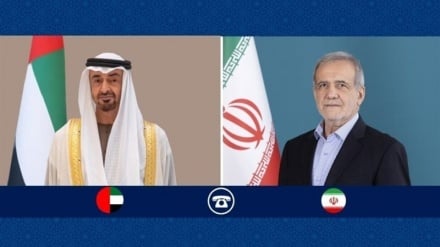UAE troops' drawdown in Yemen (2)
UAE government, in its latest decision, has lowered the number of its troops in the war against Yemen. Last week, we studied the reasons and results of this decision. Today, we study some of the outcomes of this decision, and the outlook of the Saudi coalition in the war against Yemen.
The emergence of Abu Dhabi-Riyadh disputes, and UAE decision to drawdown its forces, leaves a direct impact on the existence of the Saudi coalition against Yemen. Undoubtedly, one of the most important results of the drawdown of Emirati forces in Yemen is the isolation of the Saudi regime, practically leading to the collapse of the Saudi coalition; given that although at the beginning of the formation of this coalition, in the year 2015, it was said that the coalition is comprised of ten states; this coalition was practically comprised of two sides, being the Saudi regime and UAE.
UAE troops' retreat from Yemen is tantamount to failure in the Yemen war; given that it results in the isolation of Saudi regime in Yemen, which could lead the Saudi officials to end this war without the attainment of their main goal, which was to topple the Ansarullah Movement.
Although UAE drawdowns its forces in Yemen, one of the important strategies of UAE in Yemen, in the past four years, has been the formation of a network of UAE-backed militants in Yemen, which Abu Dhabi aims to further put to use.
Meanwhile, Qatar-based Al-Jazeera Network has cited informed Yemeni sources as saying that the Emirati forces have transferred hundreds of the elements of Transition Council out of Yemen in order to train them.
Lebanon-based Al-Mayadin Network has also reported that UAE has transferred 500 forces from the Port of Aden in southern Yemen to Abu Dhabi in order to train them.
Meanwhile, the Southern Transitional Council which was established with UAE support in May 2017, currently controls a number of important regions in southern Yemen.
Although the drawdown of Emirati troops in Yemen is synonymous to acceptance of the failure of the Saudi Coalition in the war against the Yemeni nation; this is not equivalent to complete withdrawal of Emirati forces from Yemen, given that UAE continues to back its affiliated militants in Yemen. This could in turn fuel the in-fighting between the mercenaries affiliated to Saudi regime, who mainly support the resigned Yemeni president, Mansour Hadi; and the mercenaries which are linked to UAE. If the Ansarullah forces and Yemeni army advance toward southern Yemen; the tensions between the Saudi and UAE regimes, and clashes between the militants affiliated to Abu Dhabi and Riyadh in southern Yemen will flare up, which can turn into a major security concern for Aale Saud.
Meanwhile, a number of facts should be pointed out in relation to the outlook of war against the Yemeni nation, and the outlook of the existence of anti-Yemen Saudi Coalition.
Firstly, major disputes have erupted between the emirates of UAE about the continuation of involvement in Yemen war. According to a number of reports, the rulers of a number of Emirates in UAE have piled up pressure on the UAE Crown Prince, Mohammad Bin Zayed, for termination of UAE involvement in the war against Yemen; given that the related Emirates have suffered losses and damages as the consequence of continuation of war against the Yemeni nation.
Moreover, the Saudi regime, which is led by Mohamad bin Salman, is currently facing several political, security, and human rights-related scandals. It seems as though Emirati officials do not want to get embroiled in all of the problems and scandalous cases which are related to the Saudi regime. Hence, it can be said that there will be a widening gap between Abu Dhabi and Riyadh in the war against the Yemeni nation, which can hugely impact the existence of anti-Yemen Saudi Coalition.
Secondly, there is a possibility of negotiations between UAE and Yemen's
Ansarullah, in the absence of Saudi regime. According to a number of reports, there are a number of active, secret communication networks between UAE and Yemen's Ansarullah Movement, which have apparently reached a number of agreements. Any kind of agreement between Ansarullah and UAE results in the certain failure of the anti-Yemen Coalition; piles up pressure on the Saudi regime; and escalates clashes between the forces affiliated to Abu Dhabi and Riyadh in southern Yemen.
Thirdly, analysts believe that the UAE decision to pull out its forces from Yemen will escalate tensions between Riyadh and Abu Dhabi, compelling the Saudi regime to revise its approach and policy in the Yemen war. Saudi regime tries to gain control of the regions; from which the UAE troops have withdrawn. On this basis, Riyadh has stationed a number of its troops in the southern province of Aden; which is the location within which the UAE-affiliated militants are present. This Saudi measure can fuel clashes between the forces affiliated to Abu Dhabi and Riyadh, in Aden, and can also intensify Saudi regime's problems in that war-torn country.
Finally, UAE pullout of war on Yemen results in the isolation of the Saudi regime in this war, and results in the utter failure of the Saudi regime in the face of Ansarullah and Yemen's army. Meanwhile, a number of analysts believe that one of the main goals of UAE in withdrawal of its troops from Yemen is to register a major defeat for Aale Saud, and the Saudi Crown Prince, Mohammad bin Salman.
MR/SS


